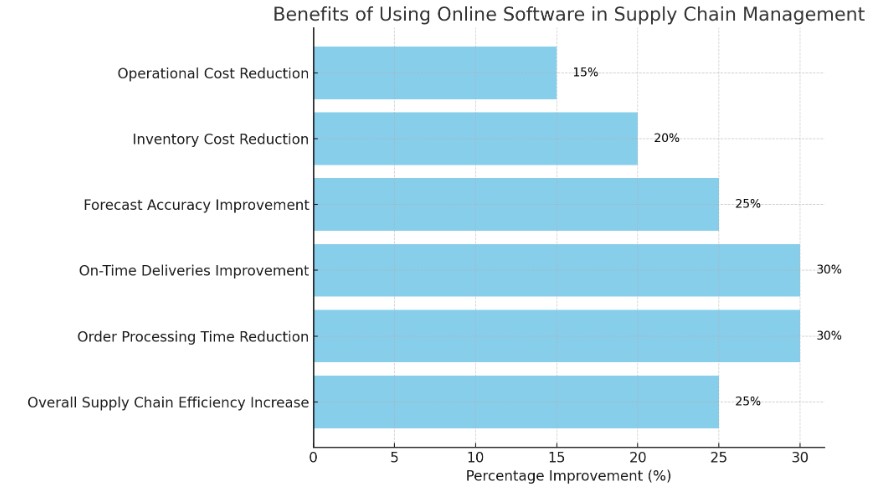Supply chain management (SCM) is a critical aspect of business operations that involves coordinating the production, shipment, and distribution of products. In today’s fast-paced and increasingly digital world, leveraging online software for supply chain management has become essential for businesses aiming to stay competitive. This post explores the advantages, key features, and best practices of using online SCM software to optimize your business processes.
The Importance of Supply Chain Management
Supply chain management is the backbone of many industries, from manufacturing to retail. An efficient supply chain can lead to:
- Reduced Operational Costs: Streamlining processes reduces waste and saves money.
- Improved Customer Satisfaction: Efficient SCM ensures products are delivered on time and in good condition.
- Greater Flexibility and Adaptability: A well-managed supply chain can quickly adapt to changes in demand or supply.
- Enhanced Collaboration: Better communication across the supply chain leads to more efficient operations and innovation.
Why Choose Online Software for Supply Chain Management?
1. Real-Time Visibility and Analytics
Online SCM software provides real-time tracking of products, orders, and shipments, giving businesses complete visibility into their supply chain operations. This transparency allows companies to make data-driven decisions, identify bottlenecks, and respond swiftly to issues.
2. Improved Collaboration
Traditional supply chain management often involves multiple stakeholders, including suppliers, manufacturers, and distributors. Online software enables seamless communication and collaboration among all parties involved, reducing the chances of miscommunication and delays.
3. Scalability and Flexibility
Whether you are a small business or a large enterprise, online SCM solutions are designed to scale with your business. They offer flexible features and integrations that can be customized to fit your unique needs as your business grows.
4. Automation of Routine Tasks
Automation is a key feature of online SCM software. Automating repetitive tasks such as order processing, inventory management, and shipping documentation not only saves time but also reduces the chances of human error.
5. Cost Savings
Implementing online SCM software can significantly reduce costs associated with manual processes, errors, and delays. Moreover, cloud-based solutions often come with a subscription model, eliminating the need for hefty upfront investments in infrastructure.
Key Features to Look for in SCM Software
When selecting online SCM software, consider the following key features to ensure it meets your business needs:
1. Inventory Management
- Real-Time Tracking: Monitor stock levels across multiple locations.
- Demand Forecasting: Use historical data to predict future demand and optimize inventory.
2. Order Management
- Order Fulfillment: Automate the process from order placement to delivery.
- Return Management: Streamline the process of handling returns and exchanges.
3. Supplier and Vendor Management
- Vendor Scorecards: Evaluate and rate suppliers based on performance.
- Purchase Order Automation: Automate the creation and tracking of purchase orders.
4. Logistics and Transportation Management
- Route Optimization: Plan the most efficient routes for deliveries.
- Shipment Tracking: Track shipments in real time to ensure timely delivery.
5. Reporting and Analytics
- Custom Reports: Generate reports based on specific metrics and KPIs.
- Dashboards: Visualize data to gain insights into supply chain performance.
Best Practices for Implementing Online SCM Software
1. Define Your Goals and Objectives
Before implementing any software, it’s crucial to have a clear understanding of what you want to achieve. Whether it’s reducing lead times, lowering costs, or improving customer service, having defined goals will help you choose the right solution.
2. Choose the Right Vendor
Select a software vendor that understands your industry and has a proven track record of successful implementations. Check for customer reviews and ask for a demonstration or trial period to evaluate the software’s capabilities.
3. Train Your Team
Effective use of SCM software requires proper training. Ensure that all users are comfortable with the system and understand how to leverage its features to optimize their tasks.
4. Start Small and Scale
Implement the software in phases, starting with one department or location before rolling it out company-wide. This approach allows you to address any issues and ensure a smooth transition.
5. Monitor and Optimize
Continuously monitor the performance of your supply chain and use the data provided by the software to make informed decisions. Regularly review your processes and look for areas where further optimization is possible.
Top Online SCM Software Solutions
There are several online SCM software solutions available, each with its own set of features and benefits. Here are some of the top options:
1. SAP SCM
A comprehensive solution offering advanced planning and optimization features.
2. Oracle SCM Cloud
Cloud-based software that integrates all aspects of supply chain management, from planning to logistics.
3. Microsoft Dynamics 365 SCM
Offers robust integration with other Microsoft tools and provides a user-friendly interface for managing supply chain operations.
4. Infor Supply Chain Management
Provides advanced analytics and automation features, ideal for businesses looking to leverage AI and machine learning.
5. NetSuite SCM
A cloud-based solution that integrates seamlessly with NetSuite’s suite of business management tools, making it a great choice for growing businesses.
Conclusion
In an increasingly competitive business environment, effective supply chain management can be a game-changer. Online SCM software offers numerous benefits, from real-time visibility and improved collaboration to cost savings and enhanced flexibility. By choosing the right solution and following best practices for implementation, businesses can optimize their supply chain operations and gain a significant competitive advantage.
Benefits of Using Online Software in Supply Chain Management
Data for the graph:
- Operational Cost Reduction: 15%
- Inventory Cost Reduction: 20%
- Forecast Accuracy Improvement: 25%
- On-Time Deliveries Improvement: 30%
- Order Processing Time Reduction: 30%
- Overall Supply Chain Efficiency Increase: 25%
This bar chart visualizes the benefits of using online software in supply chain management. It shows various improvements in key areas such as cost reduction, efficiency, and accuracy.
Chart Description
The chart below displays the percentage improvement in different aspects of supply chain management achieved by using online software tools:
- The X-axis represents the percentage improvement (%).
- The Y-axis lists the different areas of improvement: Operational Cost Reduction, Inventory Cost Reduction, etc.
The chart is structured with the highest value on top for better readability, and each bar is labeled with the respective percentage value.
Key Insights
Using online software for supply chain management offers significant benefits, including:
- Improved operational efficiency.
- Better accuracy in demand forecasting.
- Reduced costs associated with inventory and order processing.

Here are some key statistics related to the use of online software in supply chain management:
1. Adoption Rates and Benefits
- 90% of supply chain leaders plan to invest in technologies that enable greater supply chain resilience, such as digital twins and cloud computing, by 2025 (Gartner).
- Companies using online supply chain management software experience an average 15% reduction in operational costs and a 20% reduction in inventory costs (Deloitte).
2. Market Growth
- The global supply chain management software market was valued at approximately $19.56 billion in 2020 and is expected to reach $37.41 billion by 2027, growing at a CAGR of 10.4% from 2021 to 2027 (Fortune Business Insights).
3. Efficiency Improvements
- Businesses using advanced supply chain software reported a 25% improvement in forecast accuracy and a 30% increase in on-time deliveries (Capgemini).
- Online software can reduce order processing times by up to 30%, allowing businesses to meet customer demand more effectively (McKinsey & Company).
4. Real-Time Visibility and Analytics
- 73% of supply chain executives believe that real-time data analytics significantly improves their ability to make strategic decisions (Forbes Insights).
- Implementing real-time tracking and analytics through software can lead to a 25% increase in overall supply chain efficiency (IBM).
5. Automation and Cost Savings
- Automation in supply chain management can reduce manual data entry by up to 80%, leading to fewer errors and increased productivity (Boston Consulting Group).
- Companies that utilize supply chain management software with automation features report an average of 10-15% cost savings in logistics and inventory management (Deloitte).
These statistics highlight the growing importance and benefits of integrating online software solutions in supply chain management.












Leave a Reply